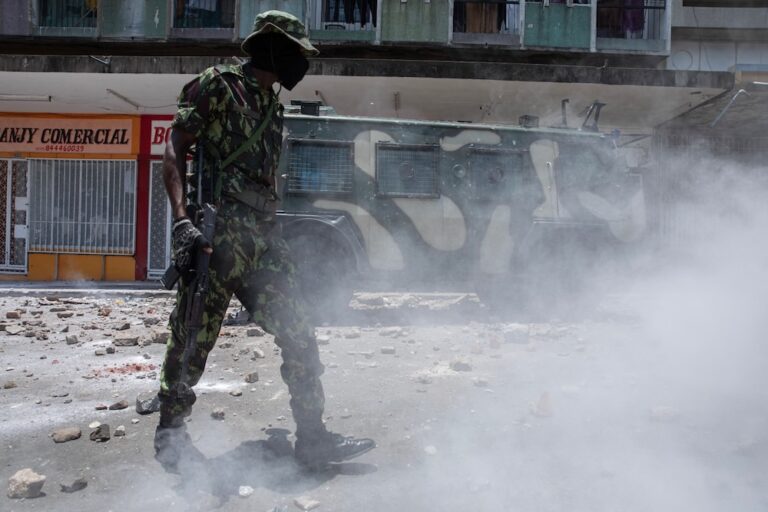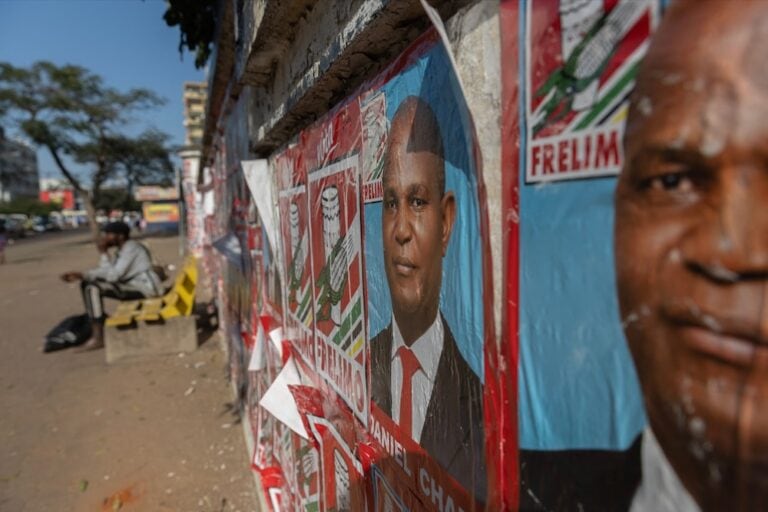(MISA/IFEX) – Afonso Dhlakama, the leader of Renamo, Mozambique’s main opposition party, said on 12 November 1999 that he was “in solidarity” with all Mozambican journalists. He added that they were “courageous”, but that the problem lay with editors who “harass” their reporters and “always cut their texts when these are good”. **Updates IFEX alert […]
(MISA/IFEX) – Afonso Dhlakama, the leader of Renamo, Mozambique’s main
opposition party, said on 12 November 1999 that he was “in solidarity” with
all Mozambican journalists. He added that they were “courageous”, but that
the problem lay with editors who “harass” their reporters and “always cut
their texts when these are good”.
**Updates IFEX alert of 28 October 1999**
Dhlakama’s statements came a day after his party “invited” reporters from
the daily paper “Noticias” to stop covering the Renamo election campaign
because the paper was allegedly biased against the party and Dhlakama.
Speaking at a press conference on 12 November, Dhlakama alleged that
directors and editors of the media censored the reports written by their
journalists.
“There are brave journalists who challenge the management of their media to
publish their work,” he said. “I am not going to mention their names because
this might be dangerous for them. They might even lose their jobs, as
happened with other good colleagues of theirs such as Jose Chitula, who was
expelled from Mozambican Television (TVM) for telling the truth.”
The incident Dhlakama was referring to happened several years ago, and
Chitula currently works on the Renamo-sponsored radio station, Radio Terra
Verde.
As for banning “Noticias”, Dhlakama said he was not against the newspaper as
such, but against the system allegedly established there of discriminating
against coverage of the opposition, and of Renamo in particular.
Without specifically referring to “Noticias”, Dhlakama said there was no
transparency in the media coverage of Renamo’s election campaign. He claimed
there was a gross disparity between coverage of the Renamo campaign and that
of the ruling Frelimo party.
“We organise rallies and other demonstrations that last an hour or more, but
when they appear on television or on radio they are only transmitted for one
or two minutes, as opposed to 20 or 30 minutes for the rallies of President
Chissano and Frelimo,” he said.
According to the Mozambican news agency (AIM) at no time has TVM shown
footage of twenty minutes or half an hour from a single rally, and Radio
Mozambique has never broadcast large segments of campaign rallies. AIM
further reports that every night, TVM extends its normal news programme with
an “Election Special”, which gives every impression of an attempt to achieve
balanced reporting. The problem, according to AIM, is that Frelimo is much
more active than Renamo. Since the campaign started on 19 October, Chissano
has addressed more than forty rallies, while Dhlakama has addressed about a
dozen. Dhlakama at one point also stopped campaigning altogether for ten
days.
Meanwhile, “Noticias” has vowed to continue reporting on the Renamo
campaign. On Sunday 14 November, Dhlakama held a rally in the Maputo suburb
of Mafalala and the newspaper sent a reporter and a photographer. A
substantial story on the rally, accompanied by a picture of Dhlakama
addressing the crowd appeared in the 15 November edition of the paper.
“Nothing happened. There was no problem. Our position is that we cannot
deprive the public of information. We have the duty to inform and so we went
there and we will continue to cover the Renamo campaign,” Jaime Cuambe, the
paper’s political editor, told the AIM news agency.
However, the situation was not the same in other parts of the country.
“Noticias” reported that at a 14 November rally in Mocuba, members of the
Renamo security force harassed reporters. That rally took place central
province of Zambezia, and was addressed by Renamo general secretary Joao
Alexandre.
The newspaper reported that the Renamo security forces insisted on
inspecting what reporters from “Noticias” and the Beira daily “Diario de
Mocambique” were writing in their notepads, and demanded that the reporters
show the credentials identifying them as journalists – which the reporters
did.
The Renamo security force is a private body which is a remnant of the former
civil war, since Dhlakama had refused the government’s offer to integrate
the force into the police.
Background Information
On 24 October, Manuel Pereira, the Renamo political delegate in the central
province of Sofala, attacked the accuracy of the coverage of a Beira rally
by TVM, and by the Beira paper “Diario de Mocambique”. He suggested that
Renamo “can dispense with coverage by the media”.
However, when the media raised the issue with the party later, a
spokesperson said this was just Pereira letting off steam, and that Renamo
had no intention of banning reporters.
On 11 November, Manuel Frank, the director of the Renamo election office,
and Dhlakama’s election agent, Luis Gouveia, visited the “Noticias” newsroom
to inform the paper that Dhlakama had decided he could do without its
coverage because the paper was allegedly biased against him, and in favour
of the ruling party Frelimo. The two further “invited” the “Noticias”
reporters to stop covering the campaign.
In a 12 November letter to Dhlakama, MISA expressed its concern over the
party’s actions, which it described as an effective ban on “Noticias”‘
journalists from covering Renamo election activities.
“This has the effect of not only restricting the journalists from gaining
free access to sources about Renamo, but also raises the danger of them
being exposed to violence and intimidation in the event of them covering
Renamo election activities,” MISA said.
MISA added that, particularly during election periods, “the media should be
able to freely and vigorously report on public statements made by election
candidates and political parties so that such statements can be effectively
publicized and publicly scrutinized.” It called on Renamo to reconsider its
position with respect to “Noticias” and to further ensure the unhindered
access to, and safety of journalists at public meetings and gatherings of
Renamo.


